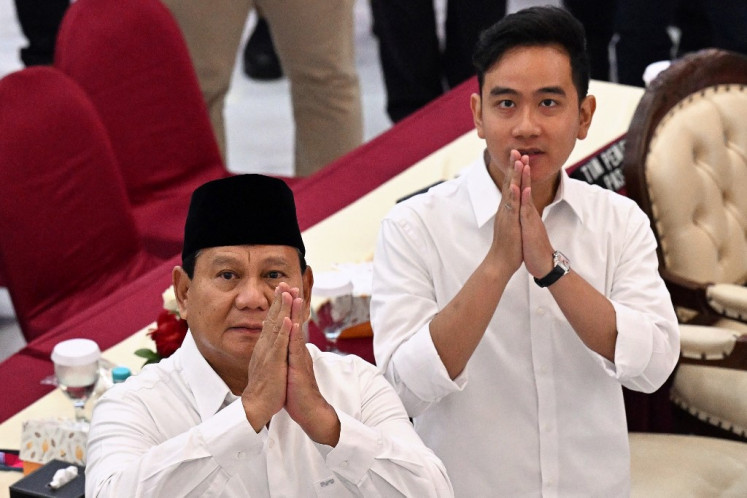Security challenges in the Asia Pacific: Importance of military cooperation
On April 29, students of the US Army Command and General Staff College gathered at Fort Leavenworth, Kansas
Change Size

O
n April 29, students of the US Army Command and General Staff College gathered at Fort Leavenworth, Kansas. The commander, Lt. Gen. Robert B. Brown, had announced that the US Congress had reassigned him to be the new US Army Pacific (USARPAC) commander.
The USARPAC commander is responsible for all US Army forces in the Asia Pacific. Also, it is the only army position that a four-star general holds in a geographic combatant command, while the Central, European, Africa, Northern and Southern commands, are held by three-star generals.
The prestige given to the USARPAC Commander is due to the strategic importance of the Asia Pacific region to the US. This has been recognized in the 2015 US National Security Strategy and 2015 National Military Strategy.
Over the last 10 years, the Asia Pacific region has seen significant and seemingly inexorable change in several areas. In the next five years, nearly half of all growth outside the US is expected to come from Asia.
China’s rise has had a major impact on the dynamics of the region. Today, China’s military ranks third in the world and continues to grow. Its officially disclosed military budget grew an average of 9.5 percent per year in inflation-adjusted terms from 2005 through to 2014.
China also will sustain defense-spending growth at comparable levels for the foreseeable future. Its military modernization program progressively focuses more on mission investments beyond China’s periphery, including power projection, sea-lane security, counter-piracy, peacekeeping and humanitarian assistance/disaster relief.
Moreover, China invests in defense capabilities designed to defeat adversary power projection and counter third-party intervention during crisis.
China is also involved in competing territorial claims in the East China Sea and the South China Sea. This has been seen as a growing threat by other countries in the region. As a response, Japan’s self-defense army is shifting its military capability.
South China Sea claimant countries such as the Philippines, Vietnam and Malaysia have also expressed their concerns. Indonesia, even though it is a non-claimant country, is also wary of China’s growing regional presence due to a territorial dispute over Natuna Island.
United States Pacific Command holds a pivotal role to support US interests in the region. In addition to a rich military experience, great diplomatic and communication skills, a strong understanding of the region’s history and culture are also needed to address the unique conflict patterns in the region. These patterns are often triggered not by geographical disputes or military intimidation, but by mistrust and misunderstanding.
For example, the US deployment of Marines to Darwin in 2011 was met with suspicion by Indonesian military leaders. They felt that an increased US presence would influence Australia’s position toward Timor-Leste and Papua.
A lack of communication between the three countries created heated tension.
However, consequent intensified communication between the three countries changed things around. Indonesia not only welcomed the presence of the US Marines in Darwin, but also benefited through humanitarian and joint disaster-relief exercises.
The US and other countries in the Asia Pacific region should continue to nurture great relationships, not just at the military level but also at the people-to-people level.
The importance of these relations remains key to avoiding distrust in the region.
Organizations such as IKAHAN or the Defense Alumni Association Indonesia-Australia nurture close personal relations among all military personnel who have taken part in personnel exchanges through visits, study or joint exercises between the two nations.
Indonesia’s military relations with the US and other countries can continue to be enhanced through educational opportunities and military exercises.
For instance, the School of Advanced Military Studies (SAMS) in Kansas is a great program for Indonesia because of its intensive focus on military knowledge. Unfortunately no Indonesian student has had the opportunity to study at SAMS so far.
Furthermore, the possibility of having an Indonesian liaison officer at the US Combined Arms Center would be important to synchronize doctrine and interoperability.
Another strategic opportunity would be having the top ten graduates of the Indonesian Army Command and General Staff College visit the US Army Command and General Staff College, US combat units and other military schools in the US to expand global knowledge and views.
After all, globalization must be understood so that Indonesia can create its own ways of combat that are also relevant to current international events.
Nevertheless, understanding globalization does not mean that the Indonesian Army would lose its identity as a people’s army, a warrior army, a national army and a professional army.
Education and people-to-people relationships are key to avoid military confrontation among Asia Pacific countries.
With the unique threats posed by terrorism, natural disasters and other non-traditional security threats, military cooperation in education and interpersonal relations could strengthen civic missions in society.
Thus, a stronger military presence can be beneficial to society and the world at large.
______________________________
The writer is a student at the US Army Command and General Staff College, Kansas, US and a member of Defense Alumni Association Indonesia-Australia (IKAHAN). The views expressed are his own.









